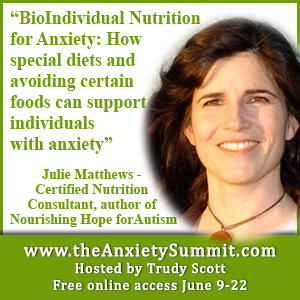Julie Matthews, Certified Nutrition Consultant and author of award winning book, Nourishing Hope for Autism, is interviewed by host of the Anxiety Summit, Trudy Scott, Food Mood Expert and Nutritionist, author of The Antianxiety Food Solution.
BioIndividual Nutrition for Anxiety: How special diets and avoiding certain foods can support individuals with anxiety
- how the body and brain are connected
- opiates, salicylates, amines, glutamates and oxalates
- how special diets can help: GFCF, GAPS, low oxalate diet, FODMAPs
- how to support biochemical pathways such as sulfation and methylation
Here are some great gems from my interview with Julie:
the brain is not this isolated island all by itself: it is connected to the body and all the biochemistry in the body affects what’s going on in the brain
different people might have similar biochemical pathways that are impaired, but they may manifest that differently – for some, with anxiety, some might have ADHD, some might have autism
gut flora is a really important factor in mood
I highly recommend Julie’s book Nourishing Hope for Autism: Nutrition and Diet Guide for Healing Our Children
And Julie shared this about her book and her work
My book is called Nourishing Hope for Autism, but a lot of people that have other conditions get my book, particularly because I call kids with autism the canaries in the coalmine. They’re the ones that are telling us that our world is too toxic, there’s too many stressors, it’s too deficient in nutrients, and we need to change our ways by adding more nutrition, more absorbable forms of supplements, getting supplements in general, eating good foods that are nutrient dense. These principles are principles that apply, in my experience, to almost all healing. So we learn a lot from the kids with autism on how it might apply to anxiety and other conditions.
We discussed the overlaps we see in autism and mood disorders: digestive issues, neurotransmitter deficiencies, gluten issues, low blood sugar, pyroluria etc.
Here is an article on Dr MacFabe’s work on gut bacteria: Spotlight on the Gut Bacteria-Brain Connection in Autism
Get your free gifts from Julie:
Using Food and Nutrition to Improve Autism and ADHD (includes info on some of the special diets even though title is about autism/ADHD)
Two hour oxalate interview and transcript (for Practitioners)
If you are not already registered for the Anxiety Summit you can get live access to the speakers of the day here www.theAnxietySummit.com
UPDATE: Season 1 of The Anxiety Summit concluded on Tues 6/24/14. If you’d like to be on the notification list for the next summit just sign up here www.theAnxietySummit.com
Missed this interview and want this and the other great interviews for your learning library? Purchase the MP3s or MP3s + transcripts + interview highlights and listen when it suits you

Believe my body makes its own, but greatly helped by slowly lowering the amount of foods I eat with oxalates. Heard that B6 can be helpful but for me it caused more pain in head and B1 helped quite a bit.
What effects sulfation? or if the oxalates get into the cells or not?
we had repaired a roof leak that had aspergillus as one of the spores in abundance and wonder if it could have grown in me.
recall a recipe for spinach using lemon juice saying it made the minerals more available, wonder if thats really true.
Lynn – I’m going to have Julie come and comment on this for you – Trudy
Also found after many months and feeling some better. was getting histamine reactions. Sudden sneezing (rarely sneezed or had hayfever after stopped wheat), or sudden runny nose after certain foods and even after vite B1 supps. SO reduced somewhat histamine foods… Still trying to figure next step(s) in this to be healthier process.
Hi,
I sent request for info about oxalates and other but it did not arrived.
I didn`t find it in junk mails too.
Please, help!
Hi Lisa
Sorry about this – if you’re still having problems please contact support@everywomanover29.com and we’ll see how we can help. Please explain what happens when you sign up
Trudy
I really related to her comment that sugar has an opiate effect on some folks. I think that’s me. In this case, what type of enzymes, specifically, would be helpful?
JoAnn
The best is this: just don’t eat sugar and use the amino acids if you can’t quit.
Thank you for providing this excellent information about nutrition as it relates to autism: I love the author’s refreshing look at and concern for autistic children, calling them the “canaries in the coal mine.”
Such interesting information! I’ve always thought that food sensitivities are a form of energetic sensitivity. They go hand in hand.
I look forward to sharing this as I know too many children who are affected by this at different levels of the spectrum
Yes the brain is not at work in an isolated environment.
This information will be passed on by me to people I know
who would immediately understand a new approach to their situation.
Julie is so knowledgeable about this. It’s really great that you were able to have her on the summit to share this information.
Thanks for sharing this resource, Trudy. I am glad that more and more information is being shared on this topic. Personally, I have long suspected that ADHD, Autism, Allergies, Asthma, Digestive issues, autoimmune disorders all stem from the same source: lack of nutrients and too many toxic Chemicals. Another great person to follow is Tom Malterre. I’ve been learning a lot from him. He’s great!
Thanks Tiffany and excellent point! I also love Tom Malterre and will be interviewing him on my next Anxiety Summit to talk about toxins